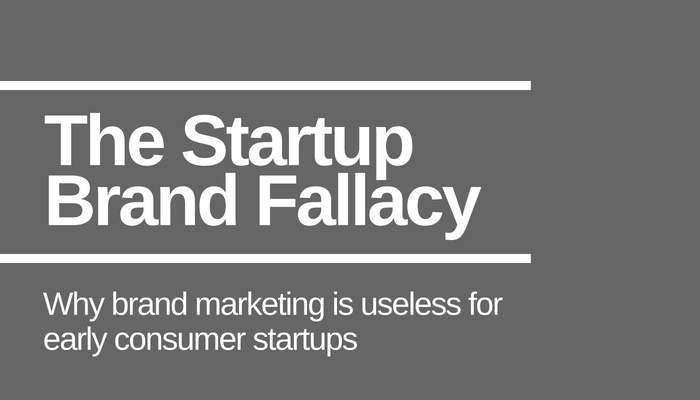The Startup Brand Fallacy: Why brand marketing is mostly useless for consumer startups

Brand marketing is mostly useless for consumer startups. Startups build a great brand by being successful, finding product market fit and scaling traction, etc. But it’s not a real lever. Let’s not mix up correlation with causation!
If this seems contrarian to you, it’s because there’s a vast ecosystem of consultants, agencies, and other middlemen who are highly incentivized to have you spend $ and effort on non-ROI/non-performant activities. Early startups should opt out of all of this
It’s easy to confuse correlation and causation: If you’re starting a consumer startup, you see successful late stage cos with fawning media coverage, amazing conference speaking slots, celebrities on the cap table, etc., and think that’s what caused their success: Great brand.
But great brand is the lagging indicator of success. The buzz is created by the hard work that the entrepreneurs put in: Finding product/market fit, hiring a great core team, finding acquisition channels that scale. Brand marketing is great, but it should be layered on later.
The greatest consumer products in recent years slogged through years of obscurity. The overnight success of Uber, Airbnb, Instagram, etc were actually multi-year successes driven by hard work and multiple pivots.
Working on press mentions, conferences, etc can be a good way to get an initial hit of traffic. It’s great! But it’s not enough. Here’s an article from a few years back: After the TechCrunch bump, there’s life in the trough of sorrow.
Anyone who’s been on the homepage of TechCrunch, AngelList, Hacker News, or even in the NYTimes knows that it’s a increase to your dopamine but not so much your customer acquisition :) It’s great for the early days, but you need a lot more to scale.
Furthermore, the metrics-driven argument is obvious. Ultimately, the engagement in every product can be deconstructed into a series of user cohorts that join and decay over time. How does brand help these cohorts? My observation: They don’t help much.
One argument is that brand marketing can create buzz and word of mouth. OK if that’s the case, why does every brand-driven commerce company have >60% of their customer acquisition happen through paid marketing? Why do they have to buy all their customers?
If brand marketing helps make acquisition ultimately cheaper, then why does every startup’s paid acquisition become less efficient over time, even as the company becomes more well known? The same arguments apply to startups’ re-engagement efforts.
It’s true that a strong brand can confer defensibility in a noisy space – but it’s brittle, hard to create, and hard to sustain. Hard to bet on that in the early days of a startup.
Where brand marketing does matter, especially outside of consumer: Recruiting a great team. Raising money. Partnerships. These are all small targeted audiences where you can reach them with more touchy feely efforts, and it can work! So put your emphasis there.
For early consumer startup efforts, it’s better to focus on the basics. Understand your users, deliver a great product to the market that grows by itself, built moats, monetize in a user-aligned way. Grow your team, work with the best advisors/investors/etc. The basics.
Do all that, and your product’s brand will take care of itself – and then you can layer on more brand marketing efforts to 10x the effect. Just don’t do the steps out of order!
[Originally tweetstormed at @andrewchen]
PS. Get new updates/analysis on tech and startupsI write a high-quality, weekly newsletter covering what's happening in Silicon Valley, focused on startups, marketing, and mobile.
Views expressed in “content” (including posts, podcasts, videos) linked on this website or posted in social media and other platforms (collectively, “content distribution outlets”) are my own and are not the views of AH Capital Management, L.L.C. (“a16z”) or its respective affiliates. AH Capital Management is an investment adviser registered with the Securities and Exchange Commission. Registration as an investment adviser does not imply any special skill or training. The posts are not directed to any investors or potential investors, and do not constitute an offer to sell -- or a solicitation of an offer to buy -- any securities, and may not be used or relied upon in evaluating the merits of any investment.
The content should not be construed as or relied upon in any manner as investment, legal, tax, or other advice. You should consult your own advisers as to legal, business, tax, and other related matters concerning any investment. Any projections, estimates, forecasts, targets, prospects and/or opinions expressed in these materials are subject to change without notice and may differ or be contrary to opinions expressed by others. Any charts provided here are for informational purposes only, and should not be relied upon when making any investment decision. Certain information contained in here has been obtained from third-party sources. While taken from sources believed to be reliable, I have not independently verified such information and makes no representations about the enduring accuracy of the information or its appropriateness for a given situation. The content speaks only as of the date indicated.
Under no circumstances should any posts or other information provided on this website -- or on associated content distribution outlets -- be construed as an offer soliciting the purchase or sale of any security or interest in any pooled investment vehicle sponsored, discussed, or mentioned by a16z personnel. Nor should it be construed as an offer to provide investment advisory services; an offer to invest in an a16z-managed pooled investment vehicle will be made separately and only by means of the confidential offering documents of the specific pooled investment vehicles -- which should be read in their entirety, and only to those who, among other requirements, meet certain qualifications under federal securities laws. Such investors, defined as accredited investors and qualified purchasers, are generally deemed capable of evaluating the merits and risks of prospective investments and financial matters. There can be no assurances that a16z’s investment objectives will be achieved or investment strategies will be successful. Any investment in a vehicle managed by a16z involves a high degree of risk including the risk that the entire amount invested is lost. Any investments or portfolio companies mentioned, referred to, or described are not representative of all investments in vehicles managed by a16z and there can be no assurance that the investments will be profitable or that other investments made in the future will have similar characteristics or results. A list of investments made by funds managed by a16z is available at https://a16z.com/investments/. Excluded from this list are investments for which the issuer has not provided permission for a16z to disclose publicly as well as unannounced investments in publicly traded digital assets. Past results of Andreessen Horowitz’s investments, pooled investment vehicles, or investment strategies are not necessarily indicative of future results. Please see https://a16z.com/disclosures for additional important information.
